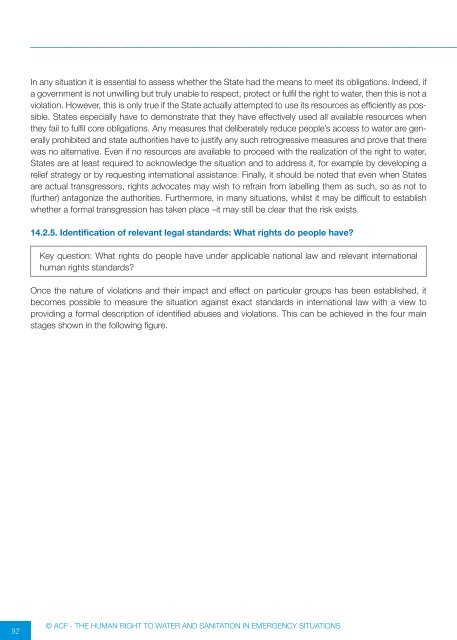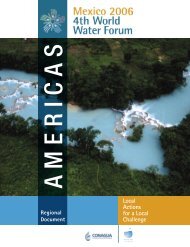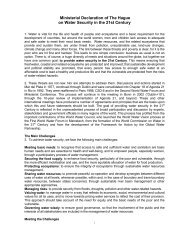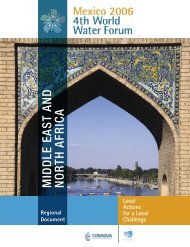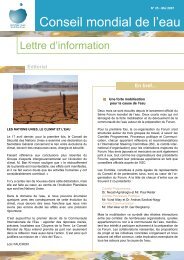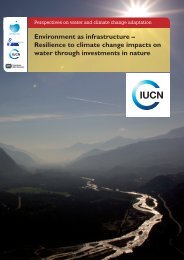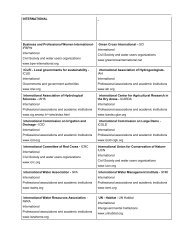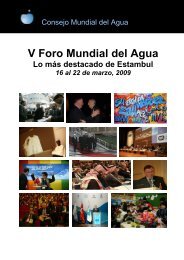the human right to water and sanitation in emergency situations
the human right to water and sanitation in emergency situations
the human right to water and sanitation in emergency situations
Create successful ePaper yourself
Turn your PDF publications into a flip-book with our unique Google optimized e-Paper software.
92<br />
In any situation it is essential <strong>to</strong> assess whe<strong>the</strong>r <strong>the</strong> State had <strong>the</strong> means <strong>to</strong> meet its obligations. Indeed, if<br />
a government is not unwill<strong>in</strong>g but truly unable <strong>to</strong> respect, protect or fulfil <strong>the</strong> <strong>right</strong> <strong>to</strong> <strong>water</strong>, <strong>the</strong>n this is not a<br />
violation. However, this is only true if <strong>the</strong> State actually attempted <strong>to</strong> use its resources as efficiently as possible.<br />
States especially have <strong>to</strong> demonstrate that <strong>the</strong>y have effectively used all available resources when<br />
<strong>the</strong>y fail <strong>to</strong> fulfil core obligations. Any measures that deliberately reduce people’s access <strong>to</strong> <strong>water</strong> are generally<br />
prohibited <strong>and</strong> state authorities have <strong>to</strong> justify any such retrogressive measures <strong>and</strong> prove that <strong>the</strong>re<br />
was no alternative. Even if no resources are available <strong>to</strong> proceed with <strong>the</strong> realization of <strong>the</strong> <strong>right</strong> <strong>to</strong> <strong>water</strong>,<br />
States are at least required <strong>to</strong> acknowledge <strong>the</strong> situation <strong>and</strong> <strong>to</strong> address it, for example by develop<strong>in</strong>g a<br />
relief strategy or by request<strong>in</strong>g <strong>in</strong>ternational assistance. F<strong>in</strong>ally, it should be noted that even when States<br />
are actual transgressors, <strong>right</strong>s advocates may wish <strong>to</strong> refra<strong>in</strong> from labell<strong>in</strong>g <strong>the</strong>m as such, so as not <strong>to</strong><br />
(fur<strong>the</strong>r) antagonize <strong>the</strong> authorities. Fur<strong>the</strong>rmore, <strong>in</strong> many <strong>situations</strong>, whilst it may be difficult <strong>to</strong> establish<br />
whe<strong>the</strong>r a formal transgression has taken place –it may still be clear that <strong>the</strong> risk exists.<br />
14.2.5. Identification of relevant legal st<strong>and</strong>ards: What <strong>right</strong>s do people have?<br />
Key question: What <strong>right</strong>s do people have under applicable national law <strong>and</strong> relevant <strong>in</strong>ternational<br />
<strong>human</strong> <strong>right</strong>s st<strong>and</strong>ards?<br />
Once <strong>the</strong> nature of violations <strong>and</strong> <strong>the</strong>ir impact <strong>and</strong> effect on particular groups has been established, it<br />
becomes possible <strong>to</strong> measure <strong>the</strong> situation aga<strong>in</strong>st exact st<strong>and</strong>ards <strong>in</strong> <strong>in</strong>ternational law with a view <strong>to</strong><br />
provid<strong>in</strong>g a formal description of identified abuses <strong>and</strong> violations. This can be achieved <strong>in</strong> <strong>the</strong> four ma<strong>in</strong><br />
stages shown <strong>in</strong> <strong>the</strong> follow<strong>in</strong>g figure.<br />
© ACF - THE HUMAN RIGHT TO WATER AND SANITATION IN EMERGENCY SITUATIONS


